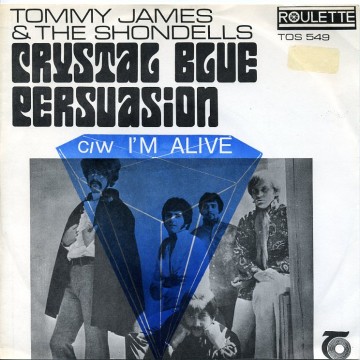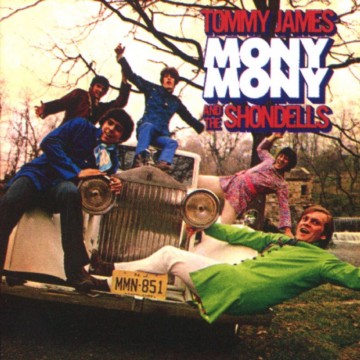
Tommy James tells it like it is in his new Autobiography “Me, the Mob and the Music: One Helluva Ride with Tommy James and the Shondells” by Tommy James and Martin Fitzpatrick.
In his new book about his life with the Shondells, Tommy James reveals the inner-workings of the music business in the 1960’s as seen through his experiences as a pop star and hit maker at Roulette Records. Behind the catchy pop tunes like “Mony Mony”, “Crystal Blue Persuasion”, “Hanky Panky” and “Crimson and Clover” was Tommy James, a nineteen year old kid who came to New York City from Michigan and quickly became a singular part of music history. Now, after selling one hundred million records, earning twenty three gold singles and nine gold and platinum albums, Tommy talked to the Northside’s Sharon Anderson about the heyday of the music in dustry, his relationship with Roulette Records and the dark side of the music business.
“Me, the Mob and the Music” is receiving excellent reviews like three and a half out of four stars in Rolling Stone, for example.
We’ve had an amazing reaction to the book and I couldn’t be happier. I’ve been working on this for a long time.
I heard that the book was going to be made into a movie, is that correct?
Yes it’ll be made into a movie with Barry Rosen as executive producer and Barbara De Fina, former wife of Martin Scorsese, as associate producer. Barbara produced Casino, The Last Temptation of Christ and Goodfellas. We’ve got an amazing crew assembled.
I couldn’t put the book down, it’s very readable. I shirked my adult responsibilities for the greater part of two days and just read this book instead.
(Laughs) That’s impressive! Anyone who can shirk adult responsibility is my kind of person.
Yeah, I owe you one. When did you start writing the book? You’d mentioned that it was a long process.
It really was. My writing partner, Martin Fitzpatrick, wrote other books like the one about the Bitter End nightclub in New York. He reviewed one of my live shows and the review was great, not just because it was flattering but his wording and command of language was so impressive. I met him and we decided to work together. We were originally going to call it “Crimson and Clover”. After we started writing we realized that we were leaving out half of the story.
You mean the story of Roulette, Morris Levy and the mob?
Exactly. Over the years I’ve been very uncomfortable talking about Roulette Records and this very dark side of the company that few people knew about except some other industry people and a couple of DJ’s. The fans know nothing about this until now. I’ve been carrying this around inside of me for such a long time, not wanting to talk about it because these people were still alive.
 When did the change occur, when did it feel ok for you to talk about this?
When did the change occur, when did it feel ok for you to talk about this?
When the last of the Roulette regulars passed away. Vinnie “The Chin” Gigante died in prison during December of 2005. He was really the acting head of the Genovese family.
So there’s no one left?
Actually a couple of them were still around but if they showed up at my door, there’s a pretty good chance I could outrun them.
(Laughs) Yeah but all humor aside, there were some pretty disturbing parts of the book like the time Morris Levy, the head of Roulette Records, had to go underground and you had to temporarily relocate to Nashville, TN for your own personal safety.
Actually I almost moved to Nashville. That was just one dangerous situation among many, though. So Martin and I realized we had to tell the whole story, all this stuff had to be in the book or we weren’t going to do it. We got a book deal when half of the book was written. It took me eight years to write the first half and eight weeks to write the second half.
What was it like for you to write this book?
I’ve never been an author before so it’s new ground for me. The process was very therapeutic. I had a great time doing it and just can’t believe how well it’s being received. You really never know how something will be received until people tell you; you hold your breath in the meantime.
The book is fascinating not only because of the dramatic mobster stories, but also because the reader gets to glimpse the whole trajectory of the music industry from the perspective of a young guy like yourself who became involved at such an early age. For example, when you wrote “Hanky Panky” it was influenced by a live tune you’d heard. So many of your stories hearken back to an era when music was live and songs were viral, something you could just catch on the wind.
That’s true, and you could really sense the future popularity of a record by people’s reactions on the dance floor. One of the reasons I always liked “party rock” was that it played live so well, you’d get a good idea of how it would be received by the public.
So it really was “one helluva ride”, the upside being this great music you created and the downside relating to the mob tactics of the recording industry.
One of the main points of the book is that at Roulette there was almost a schizophrenic atmosphere going on because we were writing and performing these hit pop songs, but there was such a serious, dangerous aspect behind all of it. Those moods permeated everything and there were mixed emotions associated with everything that happened.
It’s a great snapshot of the music industry at that time.
The thing about the music business is that it’s an industry that’s basically over. This is all a part of American history now. So many of the stories have become practically mythological. It’s really about a bygone era. A huge part of the soundtrack to our lives was made in about a six square block region of Manhattan. Everybody knew everybody and it was like a circus. When I first came to New York in the mid-sixties, it was like going to Santa’s workshop and Disneyland all wrapped up in one.
That’s part of the personal fascination I had with your book. I worked in the music industry helping to manage a chain of record stores in the late 1990’s and early 2000’s, and I felt like I really saw the tail end of that comet. I saw the industry fizzle out.
Yes, one of the best-kept secrets is that you can still make it and get signed to a record label. We’re in love with the lifestyle and romance but it isn’t real anymore.
The industry seems like a ghost, but the love for music is as strong as ever.
It’s a strange situation because they still give out Grammys and other industry awards. For example, I had an album with three adult contemporary hit singles on the charts three years ago, and one song hit number one forty years to the week that “Hanky Panky” first charted. But it was one of the most joyless hits I ever had because very few people knew we had product out.
I’ve talked to a lot of recording artists, some who like you have been around since the sixties, and many of them think that the music industry is becoming more organic. The artist plays a show, and they sell their cd afterward and through their own website, of course. Many predict that there will be no middle-man, just the artist and the consumer. Do you think the industry is headed in this direction?
Lately I’ve seen a ray of hope in the music business. It’s my belief that when high definition television is really up and running, the entire music business is going to move to television. That’s where the people are.
Kind of a one stop shopping approach.
I do believe that, and I believe that we are going to have channels, maybe the Sony channel for example, and we’ll have a version of what Don Imus did with his show ten years ago. His radio show became the number one morning television show. There’s no reason that approach can’t be applied to music radio as a whole. Technology will bring us television networks of video and radio. My guess is we’ll also have downloading capacity to go along with it.
Sounds hopeful!
I really believe this will happen. I have tremendous belief in the collective greed of everyone in the recording business!
(Laughs) We can count on greed to carry us through!
Yes, I think so.
In 1968 and ’69, Tommy James and the Shondells sold more singles than any group, is that correct?
We outsold everyone; yeah we sold more singles than any act in the world.
What’s it like to be so far-reaching in influence?
Well, I feel that this whole thing was a gift from the good Lord. When I look at rock and roll, I’m amazed because it’s a business that gives you maybe two years! We’ve been lucky enough to parlay that into 44 years. With all its ups and downs and zigs and zags, rock and roll keeps you young. I’ve very thankful and blessed to be doing it this long.